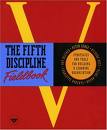 The Fifth Discipline Fieldbook by Peter Senge, Art Kleiner, Charlotte Roberts, et al.
The Fifth Discipline Fieldbook by Peter Senge, Art Kleiner, Charlotte Roberts, et al.
 The Fifth Discipline Fieldbook by Peter Senge, Art Kleiner, Charlotte Roberts, et al.
The Fifth Discipline Fieldbook by Peter Senge, Art Kleiner, Charlotte Roberts, et al.
This combines the authors' understanding of how organizations work with kata that you can do to exercise them and get them to be more flexible in coping with a curiously dynamic world. Many of the exercises seem like they would improve with the expertise of the person introducing them, so I wouldn't recommend bringing this book to work until you had a chance to practice them yourself.
If calculus were invented today, our organizations would not be able to learn it. We'd send everyone off to the three-day intensive program. We'd then tell everyone to try to apply what they'd learned. After three to six months we'd assess whether it was working. We'd undoubtedly then conclude that this 'calculus stuff' wasn't all it was made out to be and go off and look for something else to improve results.
I recall a partner in a chartered accounting firm who had been introduced to me as one of the most exceptional leaders of the Toronto business community. When I first met him, I said to myself, "This man is a mousy as they come." He spoke almost in a whisper. He could have been cast for a movie role as a nervous, unprepossessing accountant.
An hour later, I almost wanted to quit my studies and become a chartered accountant myself. I've rarely been as excited about a subject in my life. He talked about accountants as coaches and mentors: "We are like priests to an organization. We will be anywhere where anyone wants advice on the business. We will give them the best insight; we will show them how they can get where they're going." This man attracted the most talented young accountants in North America. People loved working for him. They devoted their lives to his vision of accounting as a helping profession. His charisma came not from his personality but from what he saw, what he stood for, and his ability to express it in a field that influenced thousands of others.
Helen Keller's two choices -- between being protected from harm and distress, and learning to live on her own -- illustrate a pervasive dynamic which we call "Shifting the Burden". The well-intentioned actions of Keller's parents shifted the burden of responsibility for her welfare to themselves.
No one denies that spreadsheets are useful. But they also lowered the technical barriers facing people who wanted to do financial modling. As a result, in the first few years after the introduction of spreadsheets, the average quality of financial models plummeted. Today, many financial models are not only useless, but downright harmful to decision makers who build them.On Scenario Planning ( like from TheArtOfTheLongView ):
What two questions would you most want to ask an oracle?
What's a good scenario?
What's a bad scenario?
If you could go back ten years, what would have been a useful scenario then?
What are the most important decisions you face right now?
What constraints do you feel ... in making these decisions?
What do you want on your epitaph?
The key to being a good visionary leader is not waking up at three in the morning struck by a white-lightning insight about where the company is going. The key is applying your vision to very mundane realities...
I gradually came up with a definition (of his vision), simple enough to use in talks and robust enough to ring true, time after time...
If we could get 12 percent of our people to cross that line (reflect long enough to reach a considered decision), we'd have a hell of an edge over our competitors. If we could get it up to 40 percent, we could dominate markets.